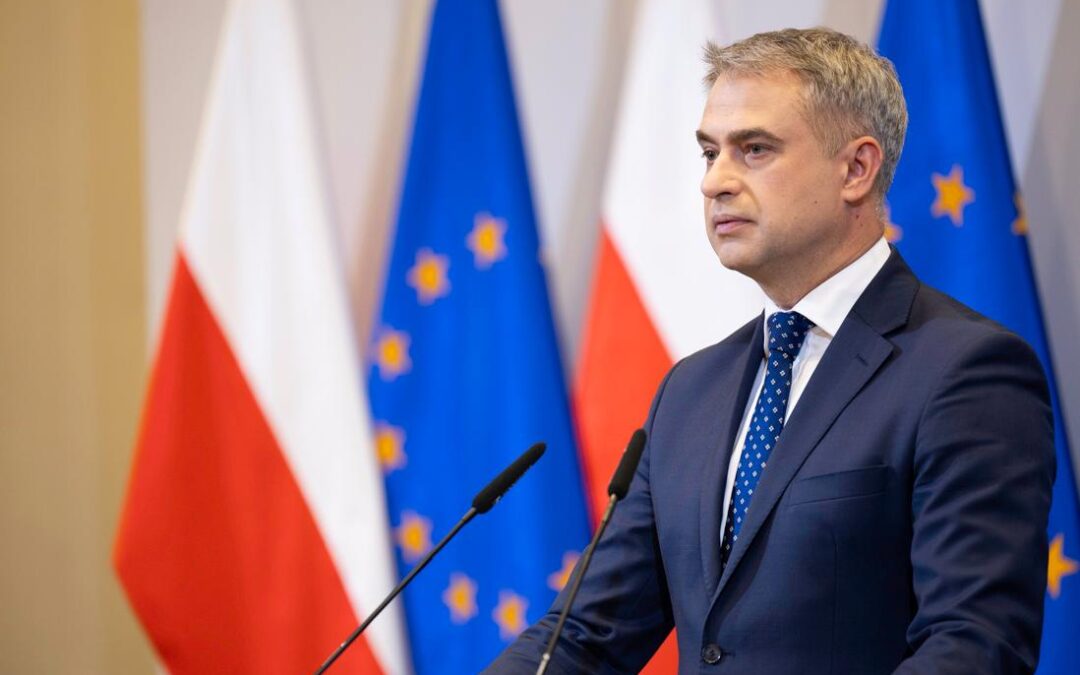Keep our news free from ads and paywalls by making a donation to support our work!

Notes from Poland is run by a small editorial team and is published by an independent, non-profit foundation that is funded through donations from our readers. We cannot do what we do without your support.
Poland says it has identified a group linked to Russia’s intelligence services that is spreading disinformation with the aim of influencing the upcoming presidential election. The government will later this month present a plan for countering such efforts.
“In recent days, a Russian group has been identified, another one inspired and prepared by the Russian military intelligence [agency] GRU, whose goal is to influence the Polish elections,” digital affairs minister Krzysztof Gawkowski told broadcaster TVN on Friday.
He said that the group was “sowing disinformation, false information” and recruiting people tasked with propagating content intended “to break up the cohesion of the political scene in Poland”.
🚨 @KGawkowski: Zidentyfikowano kolejną grupę, zainspirowaną przez rosyjski wywiad wojskowy, której celem jest wpływanie na polskie wybory.
– To jest ważna informacja dla wszystkich partii politycznych, że nie powinniśmy ulegać temu, że Rosjanie będą chcieli zdestabilizować… pic.twitter.com/45H9woyoa3
— Lewica News 🗞️📻📺 (@Lewica_News) January 10, 2025
Speaking separately to Polsat News, Gawkowski, who also serves as a deputy prime minister, said that “several thousand incidents are registered every day”, prompting “hundreds of interventions” by Poland’s security services to prevent the spread of disinformation.
“Russia is waging a cyberwar against Poland, not a cold one, but a warm one,” the minister told TVN. “We are the most attacked country in the European Union.”
He announced that, later this month, his ministry will present a plan to protect the presidential election, which will take place in May this year.
Gawkowski was also asked by Polsat about Elon Musk, who has recently drawn attention for his intervention in the domestic politics of Germany, which will hold federal elections next month, and the United Kingdom.
Last week, Poland’s foreign minister, Radosław Sikorski, warned that “influencing Polish elections from abroad is illegal”.
Gawkowski clarified, however, that if Musk gives an opinion on who people should vote for, that would fall under the right to free speech. However, seeking to influence the elections by, for example, “changing algorithms to make them win someone over” would count as illegal interference.
Poland's foreign minister has warned that foreign interference in Polish elections is illegal, following @elonmusk's recent forays into German and UK politics.
"We must protect our democratic process so that Poles, not foreigners, choose our president" https://t.co/761XvCXE5Q
— Notes from Poland 🇵🇱 (@notesfrompoland) January 7, 2025
Poland has repeatedly accused Russia in recent years of conducting a “hybrid war” against it, which has included acts of sabotage, the spreading of disinformation, and engineering a migration crisis on the Polish-Belarusian border.
In September, Gawkowski and interior minister Tomasz Siemoniak announced that the Polish security services had “broken up a group of saboteurs” working on behalf of Russia and Belarus who were targeting Polish institutions with the aim of extorting information, carrying out blackmail and conducting “de facto cyberwarfare”.
The same month, Prime Minister Donald Tusk said that Russian-linked social media accounts were seeking to “cause panic” by spreading disinformation regarding deadly floods that devastated parts of Poland.
Poland has announced a €700m “cybershield” to protect critical infrastructure amid increasing attacks from Russia.
"We are on the front line of a cyberwar with Russia, which clearly wants to destabilise the situation in Europe," says the government https://t.co/QIO8HkK2iR
— Notes from Poland 🇵🇱 (@notesfrompoland) June 3, 2024

Notes from Poland is run by a small editorial team and published by an independent, non-profit foundation that is funded through donations from our readers. We cannot do what we do without your support.
Main image credit: MSWiA (under CC BY-NC-ND 3.0 PL)

Agata Pyka is a former assistant editor at Notes from Poland. She specialises in Central and Eastern European affairs, cybersecurity, and investigative reporting. She holds a master’s degree in political communication from the University of Amsterdam, and her work has appeared in Euractiv, the Balkan Investigative Reporting Network (BIRN), and The European Correspondent, among others.



















